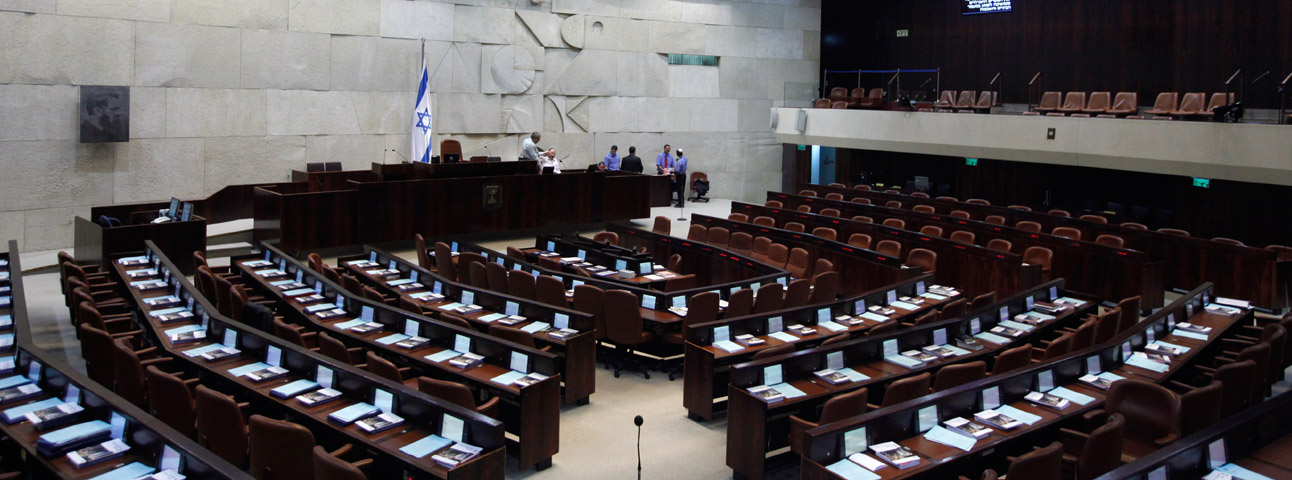A Weak and Inefficient Knesset
In a democracy, parliaments are supposed to not only pass laws but also engage in oversight; that is, to ensure that legislation is implemented and identify deficiencies in the government’s work.

The Knesset | Flash 90
The Knesset’s winter session commenced this week. Many critical issues loom overhead – but is the Knesset able to deal with the many challenges it faces? The Knesset, Israel’s parliament, suffers from many fundamental flaws, both structural and procedural. During its present term, the Speaker of the Knesset, various Knesset members and some ministers have attempted to advance a reform in its functioning, in cooperation with several organizations, including the Israel Democracy Institute. The reform, if implemented, could go a long way in helping the Knesset do a better job in serving the public it represents. Two main elements are at the heart of the proposed reform: reducing the number of private member bills submitted by MKs and strengthening the oversight ability of the Knesset.
Why should a limit be set on proposed bills submitted by individual MKs? The answer is that the Knesset has become the most active legislative manufacturer in the world, but by no means the most efficient one. In the absence of quotas or other meaningful restrictions, more than 30,000 bills have been submitted since 2000, but only a negligible minority of them was passed and became laws. Many bills deal with matters that are quite unsuited for regulation by primary legislation, while others are submitted without much thought, and only to garner media headlines for their sponsors. A sharp reduction in the number of bills that individual Knesset members can submit would make it possible for MKs to concentrate on bills (with the assistance of public officials and the staff of the Knesset Research and Information Center) with significance that have a real chance of pass and that could improve the public’s quality of life.
Why does parliamentary oversight need to be strengthened? As noted, the Knesset is plagued by several basic flaws that render it weak and ineffective. For example, its relatively small size and the large number of ministers and deputy ministers leave only about 90 MKs to serve on its committees. But the total amount of the possible nominations to the committees is nearly three times this number which leads to multiple membership of many MKs in the committees and to meager attendance in their meetings that take place simultaneously. The result of all that is inability to exercise oversight of the executive branch.
Moreover, committees' jurisdictions are corresponded to topics and not to ministries and hence are responsible for a variety of matters, and some for many ministries. This structure makes it difficult for committee members to study the many issues in their committee’s purview deeply and thoroughly. Another example is “questions". This is an oversight mechanism intended to provide an opportunity for MKs to ask ministers for information and receive answers. The catch is that ministers often do not bother to respond within the time frame set by the Knesset —a month—which is already quite a long time in today’s era that empties this mechanism of any relevancy.
This is why a comprehensive reform of the Knesset’s oversight work is essential, including structural changes such as an increase in the number of members available to serve as active parliamentarians (whether by expanding the number of MKs or by passing the full “Norwegian law” [under which ministers and deputy ministers temporarily relinquish their seats in the Knesset and are replaced by the next candidate on their party’s list], a non-amendable statutory limitation of the Government to 18 ministers, parallelism the permanent committees to the central ministries, reduction in committees' size, a limitation on the number of committees on which MK can sit, an addition of a working day to the committees (they currently meet for only two-and-a-half days a week), an expansion of the professional support staff, the introduction of the option of issue---oriented hearings, full use of the power to summon members of the executive branch to committee sessions, a modification of the question mechanism, and more.
In a democracy, parliaments are supposed not only to pass laws but also to engage in oversight, that is, to ensure that legislation is implemented and identify deficiencies in the Government’s work. At a time when the standing of the Knesset and government agencies is at an all-time low, this reform, including its two components, is essential, and its implementation would be a significant boon to the Israeli public.
The article was published in the Jerusalem Post.
